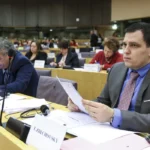Surrounded by legal investigations, former Brazilian President Jair Bolsonaro spent two nights in February at the Hungarian embassy in Brasilia, but his defense assures that he was not seeking refuge there. For the daily New York Times, which revealed this intriguing stay on Monday, supported by video surveillance images, the former far-right leader was “hiding” to escape justice.
“Fake news,” his lawyers retorted. They admitted in a press release that their client had been “housed for two days” in the embassy of this “friendly country”, led by Viktor Orban, another representative of the radical right.
But according to them, he went there “at the invitation” of the Hungarian authorities, with the sole aim of “discussing the political context of the two countries”.
“Any other interpretation (…) is fiction,” they insisted.
Video surveillance images published by the New York Times show the ex-president entering the Hungarian embassy on the evening of February 12 and leaving on the 14th in the afternoon.
A few days after a police operation during which he was prohibited from leaving the territory.
On February 8, this operation of unprecedented scale had the effect of an earthquake. Investigators detailed their suspicions of a “coup attempt” fomented by Jair Bolsonaro and his entourage to stave off his 2022 electoral defeat against his left-wing rival Luiz Inacio Lula da Silva.
Summoned Monday evening by the Brazilian Ministry of Foreign Affairs to “give explanations on the accommodation of former President Jair Bolsonaro”, the Hungarian ambassador spent twenty minutes at the headquarters of Brazilian diplomacy, according to a government source from Brasilia.
- Request for “preventive prison” –
The left was quick to take up this matter.
The former far-right leader intended to “flee (…) for fear of being tried for his crimes, of being convicted and being imprisoned”, Gleisi Hoffmann accused on the social network , president of Lula’s Workers’ Party (PT).
A deputy from this party, Lindbergh Farias, announced that he had contacted the office of the Attorney General of the Republic to demand the “preventive prison” of Mr. Bolsonaro.
“This stay at the embassy suggests that the ex-president was trying to take advantage of his friendship with a fellow far-right leader to escape the Brazilian judicial system,” said this parliamentarian.
In their press release, Jair Bolsonaro’s lawyers recalled that “it is common knowledge that the ex-president has a good relationship with the Hungarian Prime Minister.”
On February 8, Mr. Orban called Mr. Bolsonaro an “honest patriot” on social networks, encouraging him to “continue to fight”.
- “Good international relations” –
During an event of his Liberal Party, the former head of state assured Monday that he “frequented embassies in Brazil” to “discuss with ambassadors”.
“I have good international relations and I still maintain relations today with heads of state (…). They often call me to ask me for information on what is happening in our country,” he explained.
Declared ineligible last June for having disseminated false information on the Brazilian system of electronic ballot boxes, Jair Bolsonaro, 69, has seen the judicial noose tighten since his defeat against Lula.
Last week, the federal police recommended his indictment in a case of falsification of vaccination certificates against Covid-19.
He is also in the crosshairs of justice for the alleged misappropriation of gifts received from foreign countries, including jewelry offered by Saudi Arabia.
Despite these scandals, the former army captain remains very popular in his camp.
On February 25, shortly after his stay at the Hungarian embassy, he staged a show of force with a large demonstration in his support in Sao Paulo which brought together some 185,000 people, according to an estimate by researchers.
This article is originally published on msn.com






